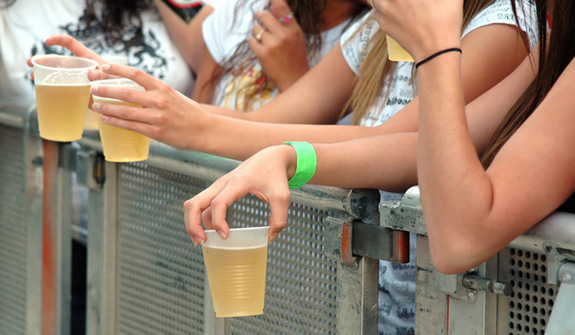Will Your Teen Become a Problem Drinker? The Brain Tells All

Years before teenagers turn to heavy drinking, their developing brains already look different from their sober peers, according to a new study.
Researchers followed a group of teenagers over three years and found that those who developed heavy drinking habits (defined as four to five drinks on one occasion) showed less activity in brain regions used for higher-order decision-making, called working memory, before tasting alcohol.
"This isn't to say we're going to throw every kid in a [brain] scanner; that would not be cost effective," Lindsay Squeglia, lead author who started the work as a doctoral student in the psychiatry department at the University of California, San Diego, said in a telephone interview. However, parents and educators could use deficient working memory as a red flag to prevent possible future heavy alcohol consumption.
As for why brain activity might impact drinking behaviors in teens, Squeglia and her colleagues suggest that differences in working memory could cause teens to become more vulnerable to drinking, make them forget the negative side effects, less able to weigh risks and options in general and make for a less efficient brain. [10 Cool Facts About the Teen Brain]
Teen brains
Previous research found risk factors for teen drinking that might make a teen more vulnerable, such as family history, conduct disorder problems and age, but, "the brain study was able to predict future drinking better," Squeglia said.
The researchers focused on brain regions known to be involved in working memory — the way people store and manipulate information to make higher-order choices beyond impulses, a function teens and young adults are still developing.
Get the world’s most fascinating discoveries delivered straight to your inbox.
Using functional magnetic resonance imaging, a method that detects brain activity through changes in blood flow, the group peeked into the brains of 40 adolescents ages 12 to 16 as they performed memory tests; scans were taken again about three years later, when half, or 20 individuals, had resorted to heavy drinking.
The 20 non-drinkers and 20 heavy drinkers were matched for age, gender, family history of alcoholism and socioeconomic markers.
At the start of the study, the brains of the future heavy drinkers showed less activity compared with the non-drinkers in the frontal and parietal lobe regions, which are involved in visual-spatial processing.
"Some teens are especially prone to heavy drinking because of differences in the way they process information," said David Kerr, of the Oregon Social Learning Center, who was not involved in the study. "And those differences are visible in their brains, likely before they touch a bottle."
And it turns out, heavy drinking during that three-year interval seems to have taken a toll on these teens' brains. At the three-year-or-so mark, when performing memory tasks, drinking teens showed more activity in the frontal and parietal lobes than their peers; they also showed less activity in the occipital lobe, or the brain's reward center involved in short-term memory and planning tasks.
"The heavy drinkers had to use more brainpower to complete the same task as the [non-drinking] controls," Squeglia said.
Kerr, who said the study was telling "this incredibly interesting story," notes the vicious cycle drinking and the teen brain.
"We see this interplay of bad luck — in the form of brain characteristics that make heavy drinking more likely in the future — and bad outcomes —where the teen brain is made worse for it," Kerr wrote in an email to LiveScience. (Kerr and his colleagues reported this month finding that a father's alcohol use during his childhood predicted his children's alcohol use.)
Reducing teen binge-drinking
Since 1997, binge drinking has significantly decreased in high school-age youth in the United States, according to data from the Centers for Disease Control and Prevention.
How to further decrease binge drinking is an important public health question, the researchers said.
For Squeglia, one next step is to look at other brain regions to determine if other preexisting differences exist between heavy and non-drinkers.
Future research will include "not just looking at what happens in the brain, but trying to intervene during this critical developmental period (when adolescents) start to drink," Squeglia said.
The study is detailed online today (Aug. 8) in the Journal of Studies on Alcohol and Drugs.
Follow LiveScience on Twitter @livescience. We're also on Facebook & Google+.


